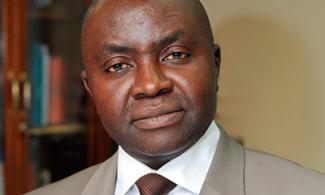
CBN, in a memo on Tuesday, announced a limit on cash withdrawals made by individuals and organisations with effect from January 9.
Financial expert and Chief Executive Officer of the Centre for the Promotion of Private Enterprise, Dr Muda Yusuf, has described the new Central Bank policy on limited withdrawals as an infringement on the fundamental rights of the unbanked Nigerians.
CBN, in a memo on Tuesday, announced a limit on cash withdrawals made by individuals and organisations with effect from January 9.
The bank directed that over-the-counter cash withdrawals by individuals and corporate entities do not exceed N100, 000 and N500, 000, respectively, per week. It also directed that only N200 and lower denominations should be loaded into banks’ ATMs.
According to the memo, the maximum cash withdrawal per week via ATM should be N100,000 subject to a maximum of N20,000 cash withdrawal per day.
At plenary on Wednesday, some senators raised concerns about the new policy with fears that many Nigerians would be affected negatively.
The House of Representatives on Thursday also summoned the Governor of the Central Bank of Nigeria (CBN), Godwin Emefiele over the new policy introduced by the Apex bank.
However, Dr Muda Yusuf in a statement issued on Thursday in Abuja, described the claim by CBN that there is too much cash outside the banking system as erroneous.
He asserted that the new development will negatively impact on the informal sector of the economy, adding that the informal sector is a significant part of the economy accounting for over 80% of trade and commerce in the Nigeria economy and substantial components of jobs in the economy.
Dr Yusuf pointed out that CBN needs to think through this policy properly to avoid creating more problems than it sets out to solve.
He said; "Currency in circulation as at October 2022 was N3.3 trillion, out of which N2.8 trillion was outside the banking vaults. There is nothing abnormal about this.
"Currency in circulation is meant for cash transactions and it’s a mode of payment. It is a contradiction to expect currency to be largely kept in the vault of banks, rather than outside the banks. Currency notes are printed primarily to facilitate payments in the economy by segments of the population that needs them.
"There is a difference between money supply and currency in circulation. Total money supply as at October 2022 was N50.6 trillion. Total currency in the economy was just N3.3 trillion, which is a mere 6.5% of money supply. Currency outside banks as a percentage of total money supply is even less- 5.5%.
"Currency as a percentage of GDP is a mere 1.8%. Even in the advanced economies , the percentages are much higher. The implication is that the Nigeria economy is already substantially cash-less.
"It is therefore quite curious that so much energy and resources are being dissipated in this direction. The claim by CBN that there is too much cash outside the banking system is therefore erroneous. Currency as a percentage of GDP in Nigeria is 1.8%, whereas in the United States it is about 10%. We are more cash-less than many advanced economies.
"It will negatively impact on the informal sector of the economy. The informal sector is a significant part of the economy accounting for over 80% of trade and commerce in the Nigeria economy and substantial components of jobs in the economy.
"Many of them are in very remote locations where there are no bank branches. And they transact business largely in cash. The distributive trade accounted for N23.3 trillion of the country’s GDP in 2021. This was about 15% of GDP. This restrictive policy will pose a major risk to this very critical sector of the economy.”
"There is also the risk that this policy would negate the financial inclusion objective of the CBN. Some of the informal sector operators may begin to avoid the banking system entirely.
"This could also be an infringement on the fundamental rights of the unbanked Nigerians. The CBN needs to think through this policy properly to avoid creating more problems than it sets out to solve," the statement added.